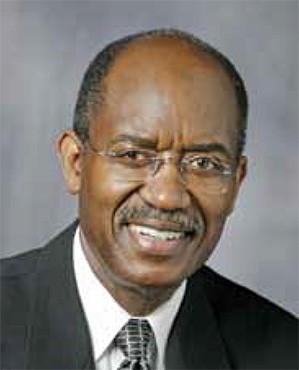
On a cold an sunny January day, to a packed Dow Auditorium, Sherman James, PhD, Susan B. King Distinguised Professor of Public Policy, Duke University, presented the U-M Martin Luther King, Jr. Health Sciences Lecture, "Healing the Wounds: The Health Disparities Legacy of the 1960s Civil Rights Movement."
James opened his presentation by saying that Martin Luther King, Jr., "like our country's current president," displayed an unshakable confidence in America's promis." James's presentation focused on 1965 to 1980, a time period during which the U.S. African American population experienced not only an unprecedented reduction in both infant mortality and deaths from cardiovascular disease, but also the greatest gains in health due to the "instanteneous desegregation" in hospital funding brought on by the Social Security Act. During the same time period, Black Southerners saw increased access to medical care, hope for upward social mobility, and higher educational test scores in children, all of which led to a reduction in hypertension, stress, and "weathering," as James called it, though "amelioration of racist social conditions."
James's presnetaiton opened with a photo slideshow. He equated the KKK to "psychological terrorism" and pointed to the absurdity of segregation, joking that "the water in the white fountain tasted just as bad." James summarized key Civil RIghts acts and examined the way the physical health of Black Southerners improved following the Civil Rights Movement, suggesting that "the vast legally assisted social disparities were the fundamental cause of disease and death disparities in the pre-Civil Rights era." James also discussed the scientific evidence bearing upon the dramatic and rapid improvement in the health of Black Southerners during the transformative period in American history.
Finally, in discussing theoretical perspectives on health care improvement, James asked how we get "traction" moving forward on solving health disparities. James prefers we focus on children to help "difuse overheated rhetoric" and implored the audience to "start early with infants if we want to do away with health disparities." He suggested that health care professionals prioritize early childhood development of economically disadvantaged chidren.
A prelude to James's presentation was preformed by the Thunderous Grace Dance Ministry, Christian Love Ministries International. The performers, wearing white and purple robes, did an interpretive dance to "The Impossible Dream" from Man of La Mancha. After the performance, Chanel F. DeGuzman, PhD, School of Public Health, welcomed the audience and said that this year "we take teh pulse of realizing the dream."
Dr. James was formerly the John P. Kirscht Collegiate Professor of Public Health at the U-M School of Public Health, the founding director (1998-2003) of the Center for Research on Ethnicity, Culture, and Health (CRECH), chair (1999-2003) in the Survey Research Center at the Institute for Social Research. Dr. James's research focuses on racial and ethnic inequalities in health status and health care, as well as community-based and public policy interventions designed to minimize, and ultimately eliminate, those inequalities. In closing his presentation, James admitted that health disparities and race are complex problems but problems we must address. "I don't know the answer," he said, "but I know we can do better."
For the past 25 years, the University of Michigan has celebrated the Martin Luther King, Jr. national holiday by cancelling classes and hosting lectures, rountables, and discussions, in addition to events that focus on the Civil Rights Movement, race, class, diversity, social justice, and societal change. The School of Social Work co-sponsors the Health Sciences Lecutre along with the Schools of Public Health, Dentistry, Medicine, and Nursing, the College of Pharmacy, and U-M Hospitals and Health Centers.
-Tim Chilcote, freelance writer and Great Lakes enthusiast, lives in Ann Arbor.